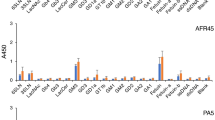Play all audios:

ABSTRACT RABBIT antibodies of the immunoglobulin G (IgG) class have been shown to be cleaved by pepsin, in the absence of mercaptans, into bivalent fragments1. These fragments, termed
F(ab′)2-fragments, sediment in the ultracentrifuge at 5_S_ and are resistant to further cleavage. Similar products have been observed after peptic digestion of human IgG antibodies2. In
contrast, others found that human immunoglobulin M (IgM) was rapidly degraded by pepsin into a heterogeneous mixture of small fragments3–5. Incubation of IgM cold agglutinins with the enzyme
in buffer at _p_H. 4.0 and 37° C for 30 min, or 4° C for 48 h, resulted in the complete loss of red cell agglutinating activity3. Efforts to demonstrate residual combining activity by an
indirect agglutination technique were unsuccessful. Similarly, treatment of IgM anti-γ-globulins (rheumatoid factors) by pepsin at 4° C for 48 h resulted essentially in complete loss of
activity, as measured by several agglutination methods3. I have examined further the degradation of human IgM anti-γ-globulins by pepsin and present evidence of the production of fragments
that retain the capacity to combine with human IgG. Access through your institution Buy or subscribe This is a preview of subscription content, access via your institution ACCESS OPTIONS
Access through your institution Subscribe to this journal Receive 51 print issues and online access $199.00 per year only $3.90 per issue Learn more Buy this article * Purchase on
SpringerLink * Instant access to full article PDF Buy now Prices may be subject to local taxes which are calculated during checkout ADDITIONAL ACCESS OPTIONS: * Log in * Learn about
institutional subscriptions * Read our FAQs * Contact customer support SIMILAR CONTENT BEING VIEWED BY OTHERS SERUM COMPONENTS INFLUENCE ANTIBODY REACTIVITY TO GLYCAN AND DNA ANTIGENS
Article Open access 22 August 2023 FROZEN FRESH BLOOD PLASMA PRESERVES THE FUNCTIONALITY OF NATIVE HUMAN Α2-MACROGLOBULIN Article Open access 20 March 2023 THE SPECIFIC CONTRIBUTIONS OF
FACTOR H AND FACTOR I IN CONTROLLING FLUID PHASE ACTIVATION OF THE ALTERNATIVE COMPLEMENT PATHWAY Article Open access 29 March 2025 REFERENCES * Nisonoff, A., Wissler, F. C., Lipman, L. N.,
and Woernley, D. L., _Arch. Biochem. Biophys._, 89, 230 (1960). Article CAS PubMed Google Scholar * Osterland, C. K., Harboe, M., and Kunkel, H. G., _Vox Sang._, 8, 133 (1963). Article
CAS PubMed Google Scholar * Harboe, M., _Scand. J. Clin. Lab. Invest._, 17, Suppl. 84, 233 (1965). Google Scholar * Kishimoto, T., Onoue, K., and Yamamura, Y., _J. Immunol._, 100, 1032
(1968). PubMed CAS Google Scholar * Mihaesco, C., and Seligmann, M., _Immunochemistry_, 5, 457 (1968). Article Google Scholar * Schrohenloher, R. E., Kunkel, H. G., and Tomasi, T. B.,
_J. Exp. Med._, 120, 1215 (1964). Article CAS PubMed PubMed Central Google Scholar * Schachman, H. K., _Ultracentrifugation in Biochemistry_ (Academic Press, New York, 1959). Google
Scholar * Schrohenloher, R. E., _J. Immunol._, 99, 115 (1967). PubMed CAS Google Scholar * Franklin, E. C., Kunkel, H. G., and Ward, J. R., _Arthritis and Rheumatism_, 1, 400 (1958).
Article CAS PubMed Google Scholar * Waller, M., and Vaughan, J., _Proc. Soc. Exp. Biol. and Med._, 92, 198 (1956). Article CAS Google Scholar * Schrohenloher, R. E., and Barry, C. B.,
_J. Immunol._, 100, 1006 (1968). PubMed CAS Google Scholar * Franklin, E. C., Kunkel, H. G., Müller-Eberhard, H. J., and Holman, H. R., _Ann. Rheum. Dis._, 16, 315 (1957). Article CAS
PubMed PubMed Central Google Scholar * Miller, F., and Metzger, H., _J. Biol. Chem._, 241, 1732 (1966). PubMed CAS Google Scholar * Metzger, H., _Proc. US Nat. Acad. Sci._, 57, 1490
(1967). Article ADS CAS Google Scholar Download references AUTHOR INFORMATION AUTHORS AND AFFILIATIONS * University of Alabama in Birmingham, Medical Center, Birmingham, Alabama, 35233
RALPH E. SCHROHENLOHER Authors * RALPH E. SCHROHENLOHER View author publications You can also search for this author inPubMed Google Scholar RIGHTS AND PERMISSIONS Reprints and permissions
ABOUT THIS ARTICLE CITE THIS ARTICLE SCHROHENLOHER, R. Degradation of Human IgM Anti-γ-Globulin by Pepsin provides Evidence of an Active Fragment. _Nature_ 223, 308–310 (1969).
https://doi.org/10.1038/223308a0 Download citation * Received: 27 March 1969 * Issue Date: 19 July 1969 * DOI: https://doi.org/10.1038/223308a0 SHARE THIS ARTICLE Anyone you share the
following link with will be able to read this content: Get shareable link Sorry, a shareable link is not currently available for this article. Copy to clipboard Provided by the Springer
Nature SharedIt content-sharing initiative
